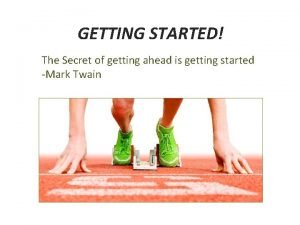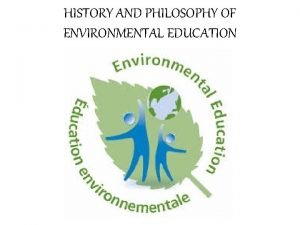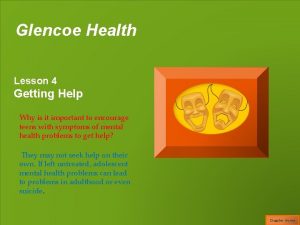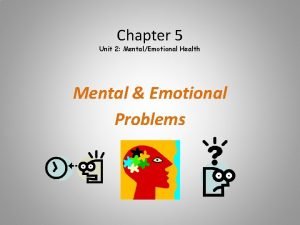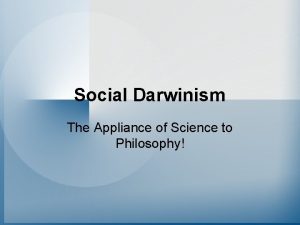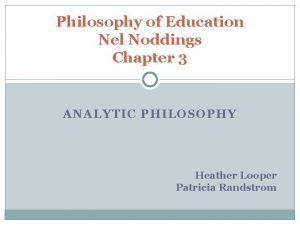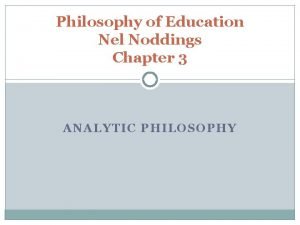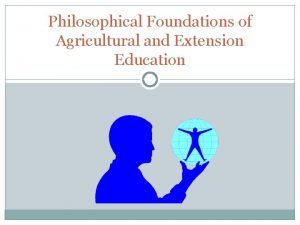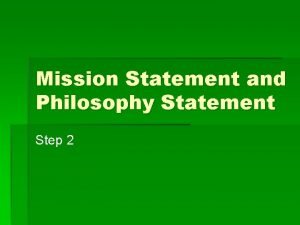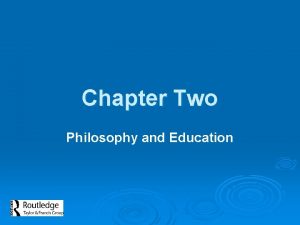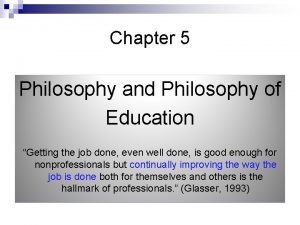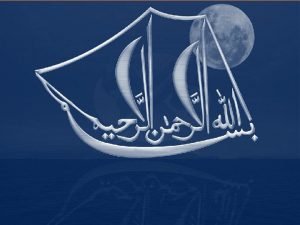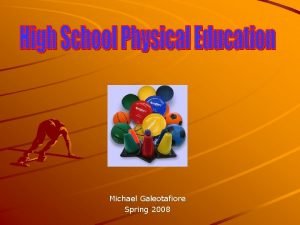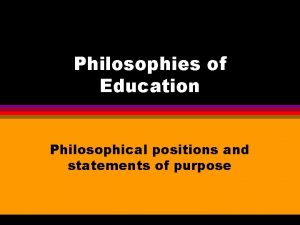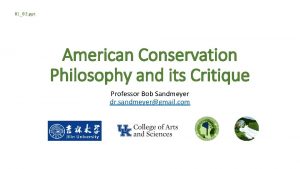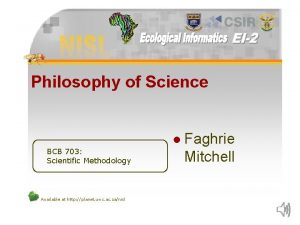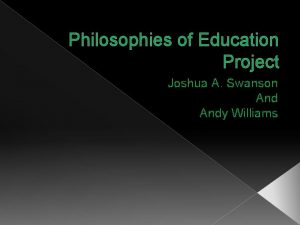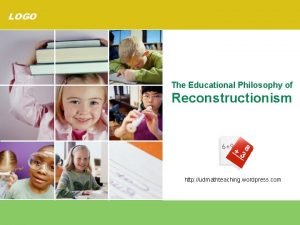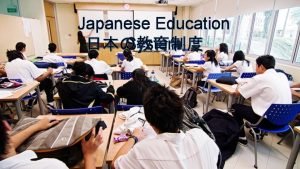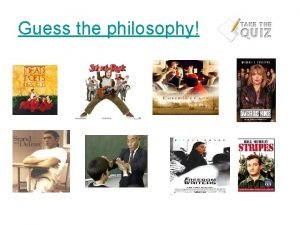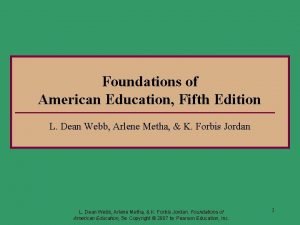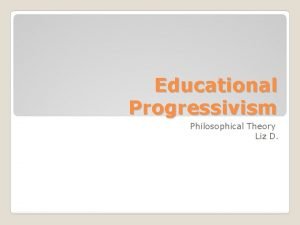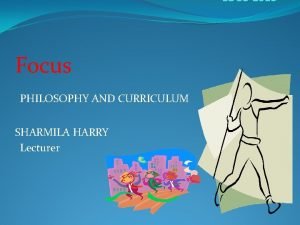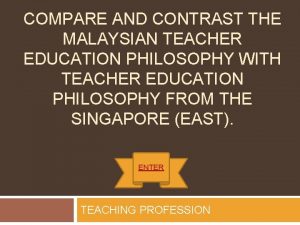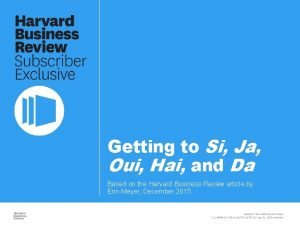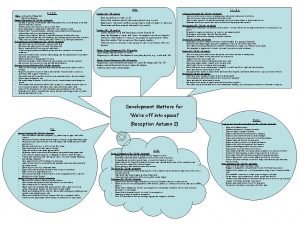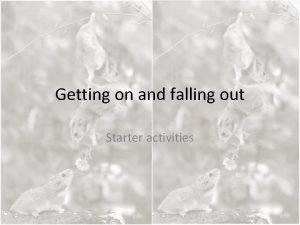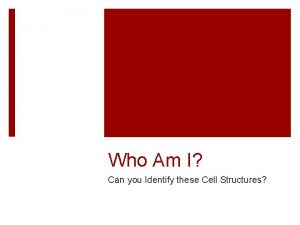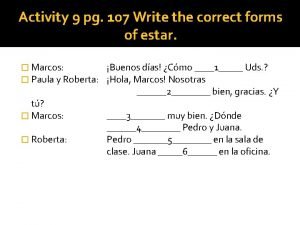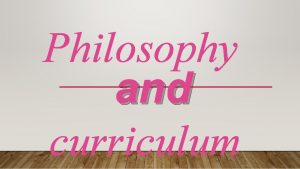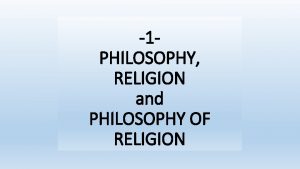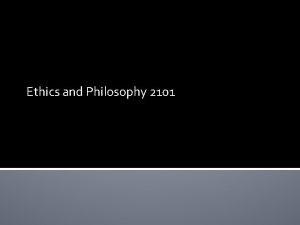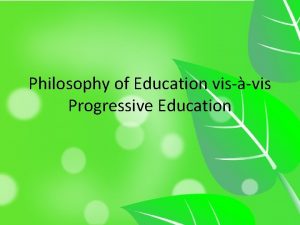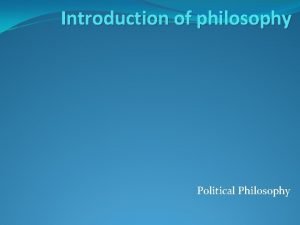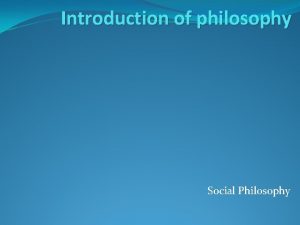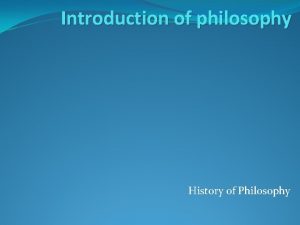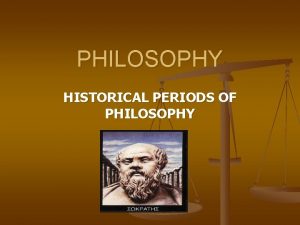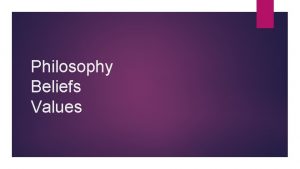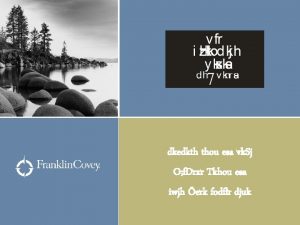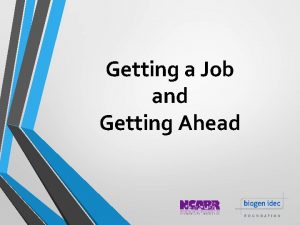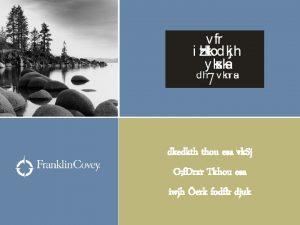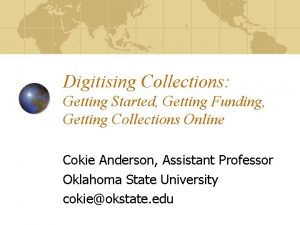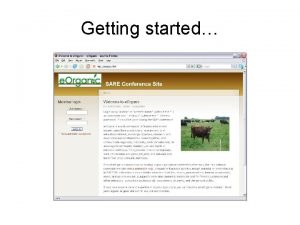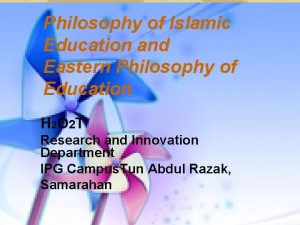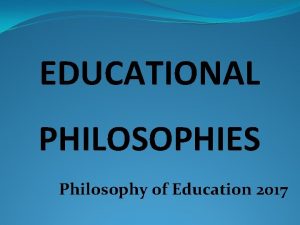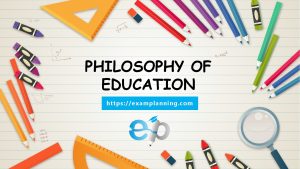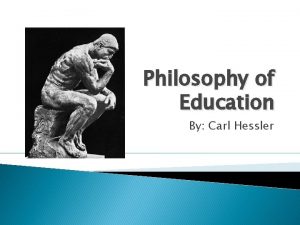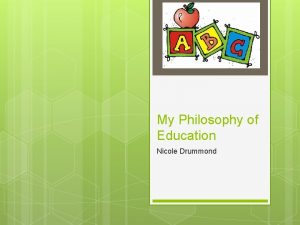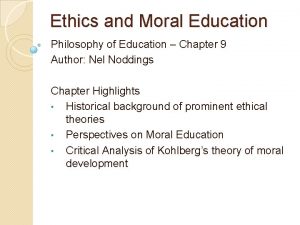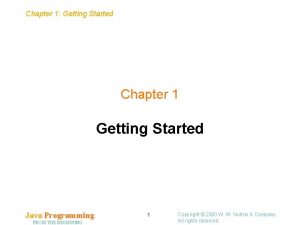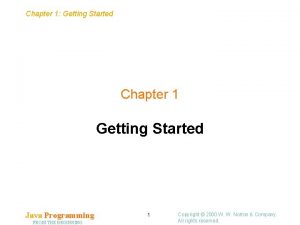Chapter 5 Philosophy and Philosophy of Education Getting



































- Slides: 35

Chapter 5 Philosophy and Philosophy of Education “Getting the job done, even well done, is good enough for nonprofessionals but continually improving the way the job is done both for themselves and others is the hallmark of professionals. ” (Glasser, 1993)

Chapter Objective n Traditional Philosophies and learning ¨ What is taught and how: how decides this ¨ Teacher’s role ¨ Student’s role ¨ Best learning medium

You Tube Clips http: //www. youtube. com/watch? v=m 0 PRB 4 Ys. Xn 4 Freedom Writers n http: //www. youtube. com/watch? v=-Nl. TELVWk 0 Billy Gilman: One Voice n http: //www. youtube. com/watch? v=lg 4 t 7 Ve 9 d. A&feature=related Waiting for Superman n

Philosophy: n n a search for wisdom Philosophy of education ¨ provides a “framework for thinking” about educational issues and dilemmas, and ¨ it guides professional practice. Normative Philosophy: n. The way neducation, narchitecture, nmedicine, or nany other profession “ought” to practice within their environment: n. Perception

Philosophy and Theory n Theories: ……………. . IDEAS ¨ a) ¨ b) n are based on observation, used to explain observations. Philosophies are based on theories: …. BELIEFS ¨ Explain: n n n The way things are Ought to be peoples thoughts and emotions Concepts over long periods of time

Major Branches of Philosophy Epistemology: examines questions of “how” we come to know what we know. Knowledge n Metaphysics, or ontology: considers the nature n of reality. What is Real. Axiology: considers questions of values and ethics. n Logic: examines the processes of deriving valid conclusions from basic principles. n

The Traditional Schools of Philosophy Idealism Realism Pragmatism Existentialism Metaphysics Reality is the world of unchanging ideas. Reality is the physical world. Reality is the interaction of the individual and the environment. Reality is the subjective interpretation of the physical world. Epistemology Knowing is the personal rethinking of universal ideas. Knowing is observing and understanding natural laws. Knowing is the result of experience based on the scientific method. Knowing is making personal choice. Axiology Values are absolute based on enduring ideas. Values are absolute based on natural law. Values are relative. Values are chosen by the individual. Educational Implications Curricula focus on content that emphasizes timehonored ideas. Curricula focus on content that emphasizes natural laws. Curricula and instruction focus on problem solving and the scientific method. Instruction emphasizes discussion designed to increase individual self -awareness. © 2005 by Pearson Education, Inc. All Rights Reserved

1) Epistemology: “Knowing Is” n “How” we come to know what we know. n A variety of ways of knowing exist. Practice and experience are important. What is factual evidence? • (Ex) examining your beliefs.

The nature of knowledge and learning n http: //cns-alumni. bu. edu/~slehar/cartoonepist. html • What is knowledge? • What is truth? • Where did knowledge originate? • How do we come to know? • How do we learn?

2) Metaphysics: “Reality Is” n n Metaphysics- (ontology)- considers “what” we know. Perceive (Debate) ¨ Independent of our perception exists. ¨ 1) reality is objective and observable ¨ 2) reality is actually perceived, since our behavior depends on our perception. n Are people basically good? n What or who is God?

3) Axiology: “Values Are” n Values and ethics Debate: ¨ Character education argues that values, such as honesty and citizenship, should be emphasized, taught, and rewarded. n Moral education ¨ emphasizes the development of students’ moral reasoning and doesn’t establish a list of values that learners should acquire. n n “What is beauty? I’m getting paid to help kids learn. If I don’t do my best, I’m not earning my salary. ” (Reasoning, value, moral)

4) Logic ……is the processing of deriving valid conclusions from basic principles. Deductive reasoning n A major premise, which can be a principle or generalization. n 1) Minor premise ¨ 2) Major premise ¨ 3) Conclusion ¨

Idealism: Terrain of Philosophy-not in book Since the physical world is constantly changing, n ideas are the only reliable form of reality. n ¨ Ideal situation; what you would like to happen ¨ Perfect marriage; teaching

Realism: Terrain of Philosophy-not in book n The features of the universe exist whether or not a human being is there to perceive them. An oak tree outside the window. ¨ You can perceive it to be anything you want, but it’s still an oak. ¨ n Philosophy of realism emphasize observation, ¨ experimentation, and ¨ critical reasoning. ¨

Pragmatism( not in book) n n Pragmatism rejects the idea of absolute, unchanging truth. Instead, truth is what works, hence the term pragmatism. Experience is the key idea ¨ Individuals need methods for dealing with changes. ¨ Pragmatic Solution ¨

Pragmatism n Pragmatism ¨ doesn’t de-emphasize the importance of knowledge; ¨ instead, it attempts to connect it to children’s interests. n n n Constructivism: build knowledge Rather than follow the rule, demonstrate. Create understanding

http: //www. youtube. com/watch? v=Bqn. WNMs. Wdq. M 30 sec. 3 Doors Existentialism (not in the book) n Humanity isn’t part of an orderly universe ¨ n n individuals create their own existence in their own unique way. With freedom comes responsibility Emphasis on the individual: we don’t teach math, science, reading, and writing; ¨ we teach people, and the people we teach are at the core of learning. ¨ n Learner-centered curriculum/instruction n http: //www. youtube. com/watch? v=zd. Zaywluk 34

Part Two: Philosophy…………. .

Philosophies of Education n Perennialism: suggests that nature, including human nature, is constant. n Essentialism: emphasizes a critical core of knowledge and skills that all students should learn. n Progressivism: focuses on real-world problem solving and individual development. n Social Reconstructionism: contends that schools, teachers, and students should play a role in addressing the social inequities in our society.

Perennials n Nature, ¨ including constant n Education ¨ is n human nature, is preparation for future life Math, science, and particularly literature are important ¨ they expose learners to n the rigors of logical thought n the great ideas that have endured throughout history. n (Classics)

Perennials n n Ex. Classic works ranging from Homer’s Iliad to Darwin’s The Origin of Species Critics question ¨ the value of distant and abstract ideas for poorly motivated and intellectually unprepared students. n They also suggest ¨ that it is the elitists that places too much emphasis on ideas that are unrelated to the student’s lives.

Essentialism n R R “Back to the basics” R ¨ learning should focus on essential basic skills, n reading, writing, mathematics, and to a certain extent, science and geography. ¨ the belief that core of information exists that all people should possess. n Reform aimed at improving teacher training

Essentialism n A “Nation At Risk” recommended that ¨ all high school students master core requirements ¨ in five “basics”-English, math, science, social studies, and computer science ¨ sequence of courses ¨ mastery of essential teaching skills n Core of knowledge exists that all preservice teachers should master. ¨ Knowledge Base for ¨ the Beginning Teacher

Essentialism and Perennialism n Are wary of ¨ learner-centered education and the focus on learner self-esteem. n Essentialists ¨ emphasize knowledge and skills that are useful in today’s world.

Standards …. and Essential Knowledge n Based on essentialism: ¨ there is a critical core of knowledge all students should master. ¨ Major role of schools should be to ensure that all students master a core of knowledge. n Critics of standards (and essentialism): ¨ crucial knowledge is learned through rote memorization, soon becoming forgotten or inert, and ¨ fails to influence students’ current or future lives.

Progressivism ¨ Problem solving and learning concepts ¨ Curriculum that focuses on real-world problem solving and individual development ¨ Insurance advertised: Progressive Insurance n Critics say: ¨ places too much emphasis on student’s interests and self-esteem ¨ Constructivism (next slide) ¨ http: //search. yahoo. com/search? p=progressive+insuranc e+youtube&ei=UTF-8&fr=moz 35

Classroom Application of Educational Philosophies

Forming a Personal Philosophy of Education n Philosophy is important ¨ it helps you explain and defend your educational goals ¨ explain what you try to accomplish in your classroom n Textbook for Quiz p. 169 ¨ are able to articulate what they’re doing and why.

Rationale for Classroom Decisions: “the belief behind your action” n Basic skills ¨ are n part of a core body of knowledge Text or curriculum¨ guide the sequence. n We did it last year: (tried and tested) n Systematic changes are made ¨ when teaching practices are in error or inadequate.

Forming a Philosophy n First, any philosophy is evolving and dynamic n Second, your personal philosophy is likely to include elements of more than one traditional and educational philosophy. n Third, be willing to change your views if you find that they are in error. (Openmindedness)

Examining Your Beliefs n Once identified, ¨ beliefs (philosophy) should be examined analyzed. (epistemology) n This is where epistemology becomes important. ¨ How do you know that your beliefs n Do they “feel” right? n Do they make sense intuitively? ¨ Is are valid? feeling or intuition adequate to justify beliefs, or must you have research evidence to indicate that they’re valid?

Educational Philosophies p. 161 Traditional Philosophy Most Closely Related Educational Goals Curriculum Role of the Teacher Teaching Methods Learning Environment Assessment Perennialism Essentialism Progressivism Reconstructionism Idealism, Realism Pragmatism Existentialism

Classroom Applications of the Educational Philosophies Perennialism Essentialism Progressivism Postmodernism Traditional Philosophy Most Closely Related Idealism, Realism Pragmatism Existentialism Educational Goals Train the intellect; moral development. Acquire basic skills; acquire knowledge needed to function in today’s world. Acquire ability to function in the real world; develop problemsolving skills. Critically examine today’s institutions; elevate the status of marginalized people (women and cultural minorities). Curriculum Emphasis on enduring ideas. Emphasis on basic skills. Emphasis on problem solving and skills needed in today’s world. Emphasis on the works of marginalized people. Role of the Teacher Deliver clear lectures; increase student understanding with critical questions. Guide learning with questioning; develop and guide practical problemsolving activities. Facilitate discussions that involve clarifying issues. Teaching Methods Lecture; questioning; coaching in intellectual thinking. Lecture; practice and feedback; questioning. Problem-based learning, cooperative learning; guided discovery. Discussion; role play; simulation; personal research. Learning Environment High structure; high levels of time on task. Collaborative; selfregulated; democratic. Community-oriented; selfregulated. Assessment Frequent objective and essay tests. Frequent objective, essay, and performance tests. Continuous feedback; informal monitoring of student progress. Collaborative between teacher and student; emphasis on the exposure of hidden assumptions. © 2005 by Pearson Education, Inc. All Rights Reserved

Your Educational Philosophy Which philosophy best describes you? Which aspect best describes you? And …Why? . . What is the role of the student: Educational Goals? Curriculum: What should be taught? What is the role of the Teacher? What Teaching Methods should be used? How would you set up the Learning Environment? What Assessments would you use. ? Idealism, Realism Pragmatism Existentialism

Philosophy and Theory n n n What do you think about this? Explain “Double Standards” Theories: ……………. . IDEAS ¨ a) are based on observation, ¨ b) used to explain researched observations. Philosophies are based on theories: …. BELIEFS ¨ Explain: n n n The way things are Ought to be peoples thoughts and emotions Concepts over long periods of time http: //www. babble. com/ mom/facebook-failteacher-shares-immoralphoto-and-gets-fired/
 The secret of getting ahead is getting started
The secret of getting ahead is getting started The belgrade charter
The belgrade charter Chapter 5 lesson 4 getting help
Chapter 5 lesson 4 getting help Chapter 5 lesson 4 mental and emotional problems
Chapter 5 lesson 4 mental and emotional problems Herbert spencer theory
Herbert spencer theory Analytic philosophy in education
Analytic philosophy in education Analytic philosophy in education
Analytic philosophy in education Philosophy of extension education
Philosophy of extension education Physical education mission statement examples
Physical education mission statement examples The three branches of philosophy
The three branches of philosophy 5 philosophies of education
5 philosophies of education History of physical education in greece pdf
History of physical education in greece pdf Philosophy of education nel noddings
Philosophy of education nel noddings Hindu philosophy of education
Hindu philosophy of education Philosophy of education
Philosophy of education Allama iqbal poetry in english
Allama iqbal poetry in english Physical education philosophy statements
Physical education philosophy statements Western philosophy of education
Western philosophy of education Realism philosophy in education
Realism philosophy in education Experimentalism philosophy of education
Experimentalism philosophy of education Ant philosophy ppt
Ant philosophy ppt Contribution of rabindranath tagore in education ppt
Contribution of rabindranath tagore in education ppt Scientific method francis bacon
Scientific method francis bacon What is perennialism in philosophy of education
What is perennialism in philosophy of education Reconstructionism
Reconstructionism Philosophy of education in japan
Philosophy of education in japan Essentialism and perennialism
Essentialism and perennialism Perennialism in education
Perennialism in education Theory of progressivism
Theory of progressivism Perenialist
Perenialist Philosophy of teacher education in malaysia
Philosophy of teacher education in malaysia Hai si ja
Hai si ja Seal getting on and falling out
Seal getting on and falling out Getting on and falling out
Getting on and falling out Series of tubes found throughout the cell
Series of tubes found throughout the cell Marta and berta are getting ready for school
Marta and berta are getting ready for school
